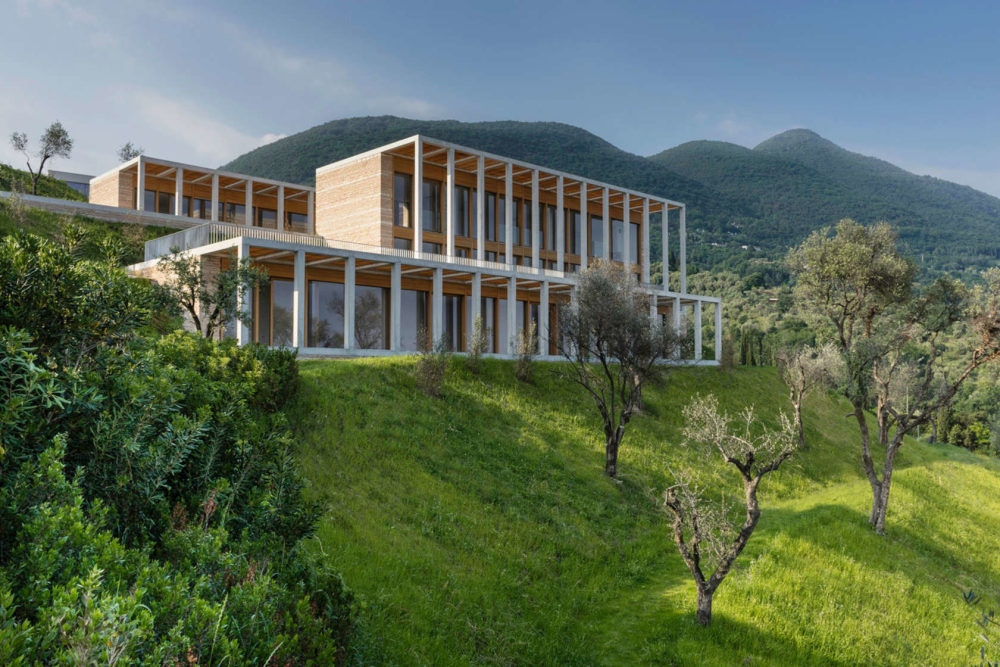
The Mediterranean Sea — referred to as “The Great Sea” in many ancient texts — has been a source of inspiration, commerce, relaxation and beauty for thousands of years. Surrounded on all sides by the densely populated regions of Western Europe, the Middle East and North Africa, the body of water has played host to a diverse range of cultures and uses over its long history. During this time, many people have sought out the land surrounding the idyllic Mediterranean for its pleasant climate, crisp sea air and breathtaking views. Dotting the edges of its shores have been a number of grand homes that draw from the eclectic mix of styles found throughout the region.
While the classic image of the Mediterranean villa has essentially devolved into a grab-bag of these styles, including Spanish Renaissance, Italian Renaissance and Venetian Gothic among others, contemporary architects have reimagined these homes ringing the Mediterranean with a more restrained and crisp modernist edge. The following collection of modern Mediterranean villas do not mimic the classicist symbols normally found in these homes, but rather use a mixture of local stone materials and clean white surfaces inspired by Greco-Roman platonic ideals to offer up a forward-thinking yet traditionally grounded residential typology for the region.
Set on the hillside of an Italian resort town, this David Chipperfield-designed home features two-story volumes stacked into offset configurations that parallel the topography. Using a material palette of locally quarried stone and wood, the structure mimics the agricultural typology of “limonaias” with the rhythmic spacing of pergolas supported by columns.
Seeking to accommodate a large program of villas, roads, swimming pools and terraces without significantly disturbing the natural and agricultural landscape, this Grecian residence inserted itself into an existing spatial fabric of the circular hillside, stone retaining walls and agricultural terraces. The stone construction and indigenous vegetation maintains the character of the Mediterranean setting, while the ambling circulation draws the user into the environment.
This modest one-bedroom villa on an isolated Spanish hillside contains a kitchen and living space on the ground floor and sleeping quarters on the low-slung second floor. The local stone material allows the small home to blend into its setting.
Moving from modern Mediterranean villas that incorporate local stone to revel in their handcrafted character to the more minimalist white tones of these Greco-Roman inspired homes, this award-winning home on a Spanish cliffside is the ultimate in refined forms and delicate yet complex massing. The swimming pool forms a serene cove off the main volume of the home, while an extruded staircase connects it to the monolithic form overlooking the sea.
The irregular volumes of this Spanish villa are inspired by the cubist work of Picasso in their disjointed massing and fragmented composition. The interplay of volumes and textures keeps the home’s overall structure difficult to apprehend, while the interlocking interiors introduce irregular spaces to the living arrangement.
Organized around a central patio, this glass- and white-brick coated in lime villa features cubic volumes arranged into tower formations that frame views of the surrounding sea. Utilizing a number of sustainable building technologies, the materials allow for a number of bioclimatic heating and cooling systems that reduce energy loads.
This glass and steel framed home was inspired by the Case Study homes of mid-century Los Angeles, including Pierre Koenig. The glass curtain wall surrounds the perimeter of the home where a garden/pool area form the outdoor public patio spaces populated by local vegetation.
